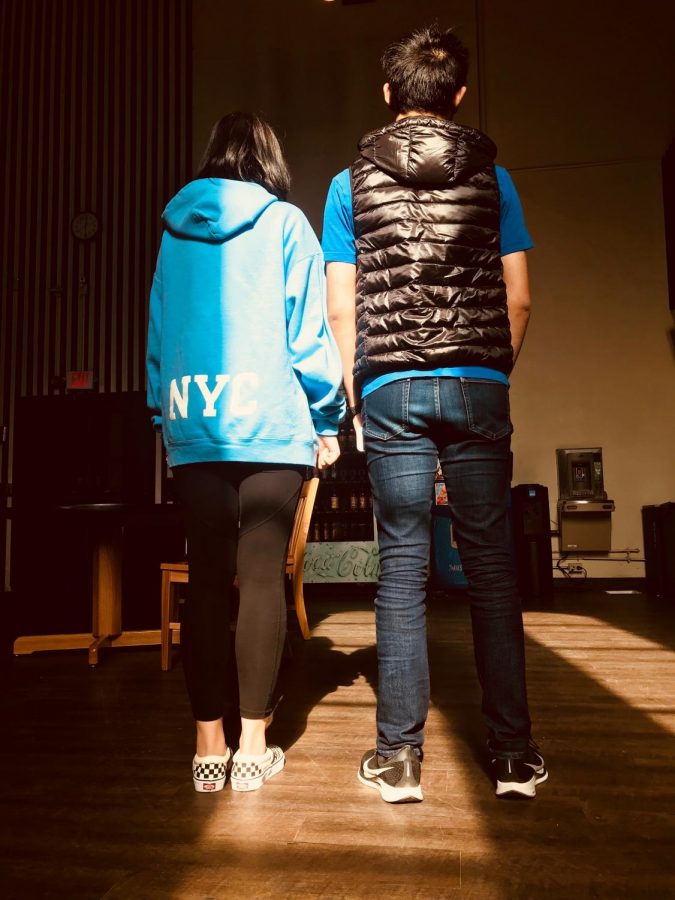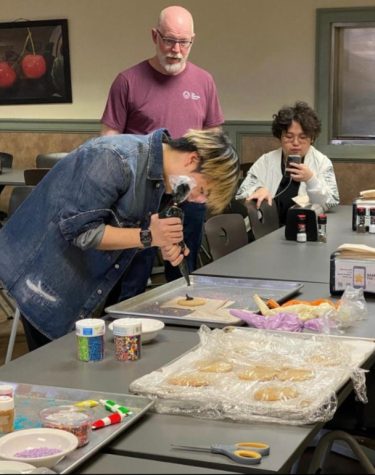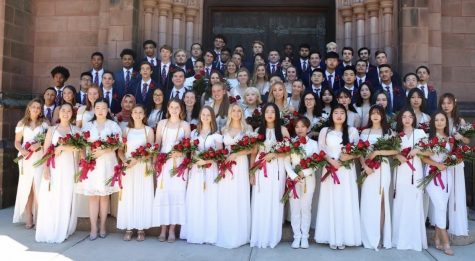Views on Dress Code Changes
Necessary Adjustment or Abuse of Administrative Power?
Senior Niki Sun and Oliver Wang demonstrate appropriate dress code attire.
October 22, 2018
In the late days of summer, students were surprised with a new dress code along with our first introduction to the New Dean of Students, Trish Cox. Students soon recognized Cox as the face of the dress code changes; however, the instigation of change was not sought out by Cox in the first place. In fact, the changes that occurred were a collaboration rather than a single-handed effort.
Cox articulated in an interview, “I had no intention of doing anything major. It’s my first year, I don’t know MacDuffie. This was a collective thing amongst the administrators who were here, so Ms. Albanese, Mr. Ruiz, Mr. Griffin, and I.”
Motivations for change of the dress code first aroused from concerns among many different members of the MacDuffie Community, including teachers, parents, students and even prospecting families. Assistant Head of School David Ruiz described, “We tried to consider all facets of the dress code — how it impacts students, families, visitors, how it differs between boarders and day, women and men, how it impacts a seventh grader versus an eleventh grader, just trying to figure out all the different aspects of the dress code.”
The code was revised to focus on what our appearance as students, and a school, reflects about our characters. According to Ruiz, many were concerned that students looked as if they had just “rolled out of bed.”
Additionally, Ruiz elaborated on financial motivations behind dress code changes, as our appearance as a school seemed to be a potential cause of some of the enrollment setbacks. Student enrollment and teacher hiring rates all affect the type of programming and classes MacDuffie is able to offer. Ruiz stated, “Anything that we can do across the board to improve our profile so that families want to come and we can have full enrollment, is something that I’m going to certainly encourage.”
The code primarily alters the guidelines surrounding what students are allowed to wear on the lower half of their bodies, and was based on the concept of dressing appropriately for school. Cox said students were, “Not [to dress] for athletics, not for the beach, and not for sleep.”
When making the code it was important to the administrators that they were not targeting any particular group as dress codes often do. Ruiz expressed that the goal was to find a “certain level of modesty” with clothes that “weren’t revealing or distracting in class, and that were neat.” Ruiz explained, “We want our kids to be free to express themselves, but we want some parameters around what we feel is appropriate for school.”
However, some MacDuffie students believe that the code’s new parameters concerning the concept of dressing to look ‘good’ are largely subjective. For example, ripped jeans that adults may see as ‘sloppy,’ students may see as fashionable.
Other students feel the code focuses on the wrong areas of students misconduct. Senior Haley Moriarty believes administration should focus more on the issues of integrity among students. She said, “To me, the school is prioritizing the way its students dress over more important issues. I’ve seen many students cheating on tests and quizzes, yet our school seems to care more about what we’re wearing rather than how its students are acting.”
Furthermore, resentments not only lie in the code itself, but in its execution. Moriarty said, “Some members of the staff seem to be prowling around just looking for students who aren’t wearing the ‘correct’ clothes.” She continued to describe an instance in which she was interrupted from her studies to clarify that she was not breaking the guidelines.
Above all else, many students view the code as an abuse of administrative power. Student Body President Talia Wiesel expressed her opinion against the changes, saying, “Personally I do not like the new dress code, especially because it was created without any student input.”
In response, over the summer, several students composed a petition which articulated their opinions of the code more thoroughly on paper. Wiesel, one of the main contributors, explained that “After the petition we hope to be able to meet with the administration and share our voice on the subject along with the voice of all of the other 200+ students who showed their support by signing the petition.”
Despite this, not all students stand in opposition to the code. Some have no issues complying with the changes, and others are in favor of the difference they have made on campus. Sophomore Jackson Skibel expressed that he has always followed these guidelines, even before they were set in place, and is happy that other students are now following suit. When asked of his perspective on the code, he charismatically replied, “[Now] I won’t stick out like a crocodile in an alligator rally.”
In the end, most students opposed to the code seek some degree of compromise with administration. On the flip side of the same coin, Cox hopes to find some common ground; she explained, “I certainly don’t want to have a precedent where things are done from the top down without student input.”
In the future, administrators are open to discussion over changes in the code, and they plan to increase communication through meetings with student body leaders. They are willing to consider student input on the changes; as Cox said, “We absolutely want students to be talking about this and helping us to figure out where we go from here.”
Ruiz is open to change on the grounds that the code doesn’t seem to fix the issue of student enrollment. However, he believes as long as the code seems fit and “our kids are comfortable, and they feel like our academic program is certainly worthwhile, and they’re being challenged, and they’re happy with our sports programs, and they’re happy with the food we’re serving them, then why go back to something that wasn’t working before?”








